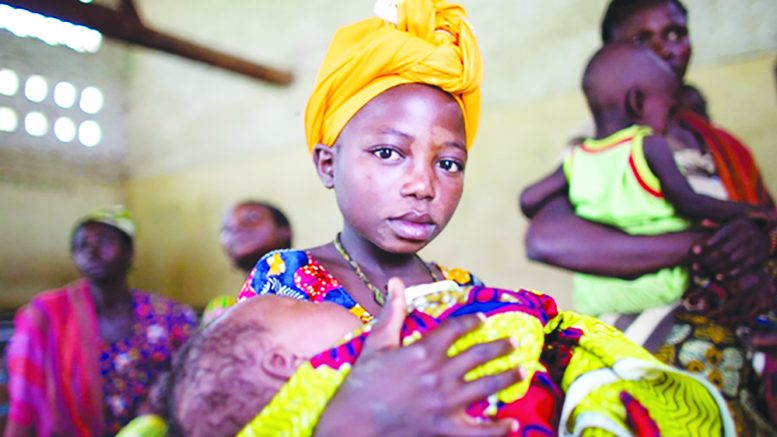“I was terrified and confused on my wedding day, I didn’t even know what I was doing.”
– Beatrice Chikwekwe
“I faced a lot of problems in marriage. I was young and did not know how to be a wife. I was pregnant, had to look after my husband, do housework, deal with in-laws, and work on the farm. My worst time was when I was pregnant; I had to do all this and deal with a pregnancy while I was just a child myself.”
— Elina V., 19, married a 24-year-old man when she was 15, Mangochi district, Malawi, September 2013
Worldwide, more than 700 million women alive today were married as children. 17% of them, or 125 million, live in Africa.
“We have a crisis on our hands. The UN estimates that 15 million girls experience child marriage each year…. We must move from vulnerability to voice and leadership. Africa is young and full of innovation. This energy must be harnessed to ensure that we have lasting solutions.”
— Nyaradzayi Gumbonzvanda, African Union Goodwill ambassador on Ending Child Marriage in Africa, national launch of the AU Campaign to End Child Marriage in Africa, July 31, 2015
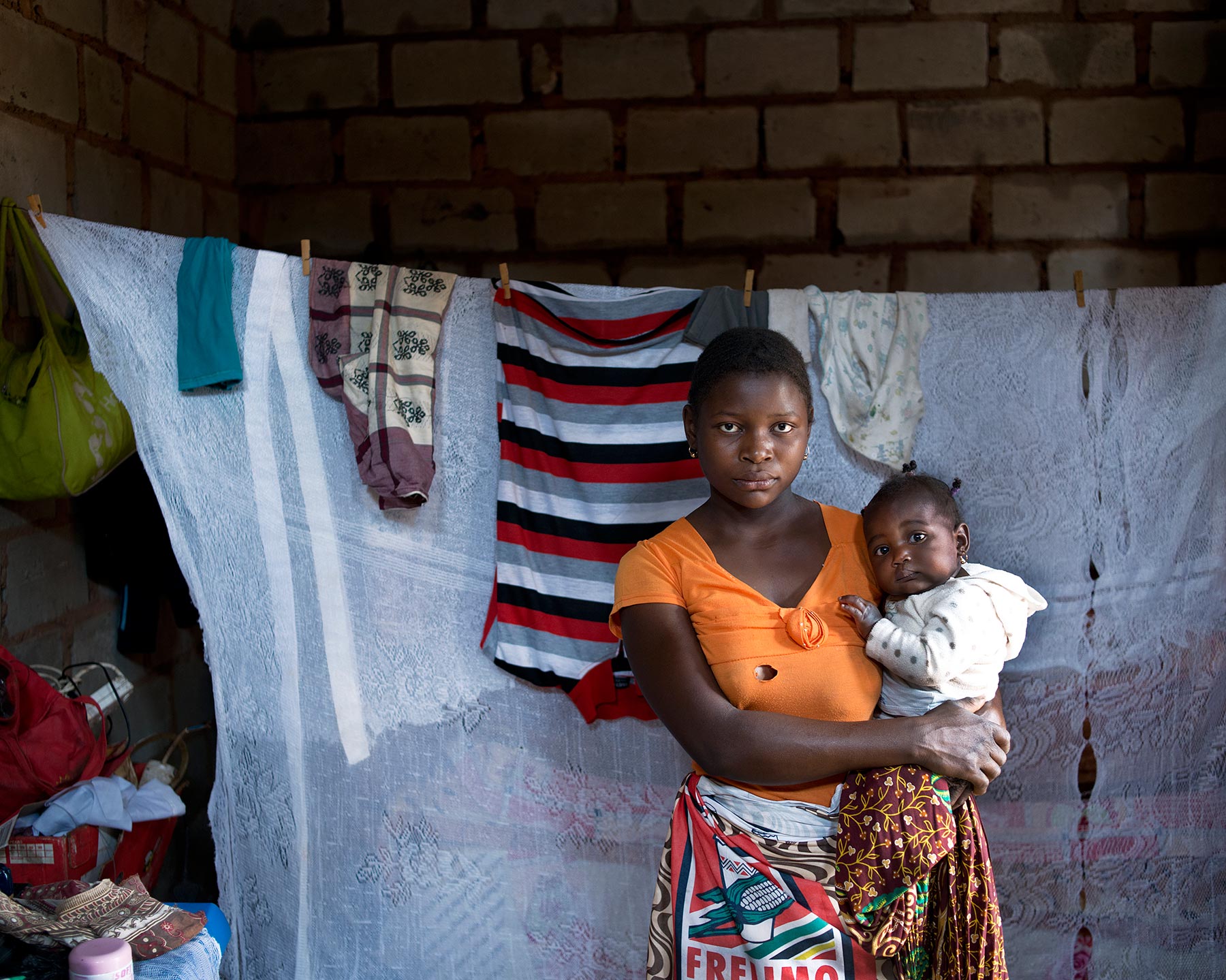
Anastasia Alfeu Nhakila and Susana AngeloAnastasia is 17 years old and her baby is 6 months old.Even though she lives with her in laws she is not married. Her ‘husband’ is working in South Africa and he comes home every six months. Their are 8 children living on this plot however Anastasia is the only one required to work. Her duties are to cook, clean, work in the field, wash the dishes, collect water and firewoodand care for her child.
In sub-Saharan Africa, a staggering 40 percent of girls marry before age 18, and African countries account for 15 of the 20 countries with the highest rates of child marriage. For example, 77 percent of girls in Niger, and over 60 percent of girls in Central African Republic and Chad, marry before they turn 18. Without progress to prevent child marriage, the number of girls married as children will double by 2050, and Africa will surpass South Asia as the region with the highest number of child brides in the world.
Girls who marry young are often denied a range of human rights: many must discontinue their education, face serious health risks from early and multiple pregnancies, and suffer sexual and domestic violence. Agenda 2063, the African Union’s 50-year action plan for development, recognizes that child marriage is a major impediment to regional development and prosperity. Countries lose out on potentially enormous social, economic, and political contributions these girls could make if given the right opportunities from the start.
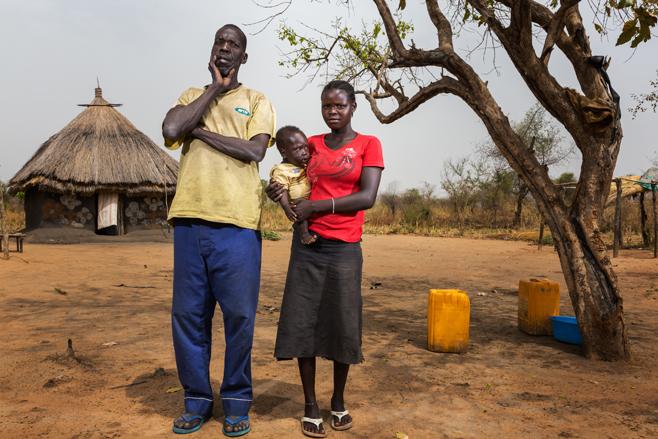
Helen, 16, stands with her husband Jade, 50, outside their home in a village near Juba. Helen married at 15 and said she would have chosen school over marriage, but her family was unable to afford school fees.
All African countries are faced with the challenge of child marriage, whether they experience high child marriage prevalence, such as Niger (77%) or lower rates like Algeria (3%). Child marriage is widespread in West and Central Africa (42%) as well as Eastern and Southern Africa (36%).
DRIVERS
The causes of child marriage are common across Africa. Parents may marry off their daughter due to poverty or out of fear for their safety. Tradition and the stigma of straying from tradition perpetuate child marriage in many communities. Crucially, gender inequality and the low value placed on girls underlie the practice.
If we don’t act now, the number of girls married as children will double by 2050 and Africa will become the region with the highest number of child brides in the world (UNICEF, 2014).
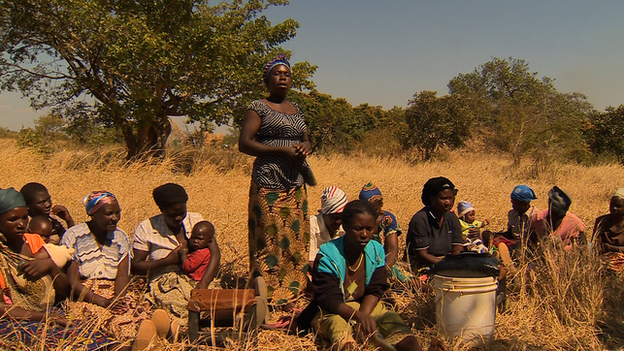
Rural communities are being educated about the effects of child marriage but traditions are difficult to break.
PROGRESS AND PROJECTS
The prevalence of child marriage has been slowly declining in Africa, but remains higher than the global average. The fastest progress in reducing child marriage in Africa has been in North Africa. The level of child marriage among the poorest families in Africa has remained unchanged since 1990.
The child population of Africa is expected to grow rapidly in the coming years, putting millions more girls at risk of child marriage. However, if progress is accelerated, the prevalence of child marriage in Africa could be halved by 2050.
But even doubling the rate of reduction will not be enough to reduce the number of child brides in Africa. By 2050, the continent will have the largest number and global share of child brides in the world. The time to act is now.
#GirlsNotBride
Zambia: Child bride Agnes
Seventeen-year-old Agnes (not her real name) was married three months ago to a man she had never met.
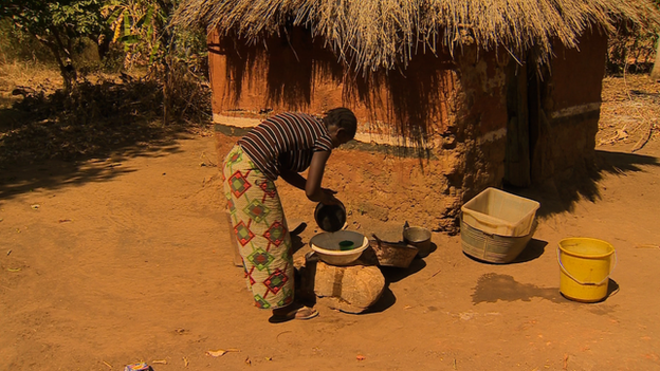
It estimated 14 million girls globally are forced into marriage before their 18th birthday
“My parents sat me down and told me I was no longer their responsibility. They wanted me to move out and start a life of my own,” she recalls, sitting in the village of Chibombo, two hours’ drive from Zambia’s capital Lusaka.
“Things moved faster than I expected – when a stranger paid a bride price to my parents. I had no say in the matter,” she says, tears welling in her eyes.
“I didn’t choose this life and I’m not happy here.”
Agnes agreed to speak on condition that we do not identify her. The BBC was also able to speak to her because her husband was away.
Wearing a striped T-shirt and a colourful sarong, she has a nervous and sad manner about her.
When we met her, she was going about her daily chores, washing dishes, cleaning and then starting a fire to prepare the evening meal.
It is not difficult to see how desperate her life is, her heels are cracked, her nail polish is wearing off.
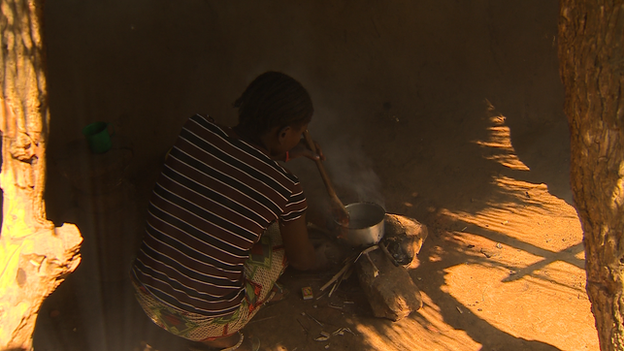
Children from poor communities are more at risk of being forced into marriage
Trapped
Early and forced marriages are common in Zambia. But this traditional practice doesn’t just happen in Africa, it’s a problem globally.
It is estimated that 14 million girls are forced into marriage before their 18th birthday every year – causing their childhoods to come to a sudden and unexpected end.
Agnes is desperate to escape her new life but fears that her parents would disown her for the disgrace that comes with being a run-away bride.
Poverty and tradition are said to be behind this practice, which is most common in rural areas.
Parents see their daughters as a source of income and even wealth, those opposed to the practice say.
But even here, some are beginning to speak out against the practice.
Chief Chamuka VI of Zambia’ Lenje people wants young girls to be kept in school.
He has summoned his subjects to a meeting under a giant tree. The villagers sing, shout his clan name and clap as they see their chief approaching.
He commands respect. Community members who attended the meeting didn’t disagree with anything he says.
Chief Chamuka, dressed in his traditional regalia – a black and red robe with a matching hat with feathers on it – addresses them about the dangers of child marriages.
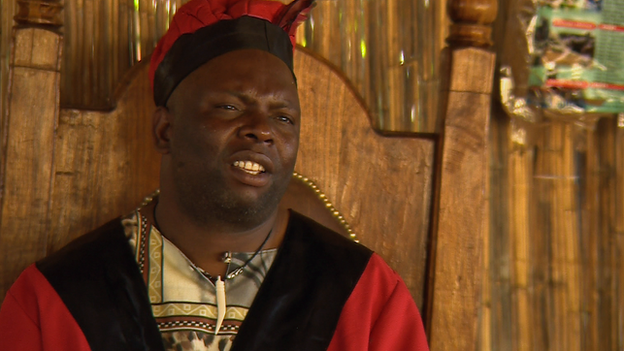
Chief Chamuka VI has told his people that child marriage will not be tolerated
“In my chiefdom, the stance which I have taken is that no parent shall force a girl below the age of 18 to be married. A parent who does that will be severely punished,” he says.
Traditional leaders who denounce early marriage are usually frowned upon by those who believe they are defying old customs and norms that have been passed on from generation to generation.
But the chief’s conviction seems unrelenting.
“I feel that in our communities there are certain customs and cultural practices that are good and some are bad – this has to stop,” he says.
Lasting effects
Those forced into child marriage feel the effects for the rest of their lives.
Beatrice Chikwekwe got married when she was 15, she is now 32.
“I was terrified and confused on my wedding day, I didn’t even know what I was doing,” she says.
“I fell pregnant the same year and had complications while giving birth. I nearly died.”
Ms Chikwekwe is doing her final year at the local college of agriculture, trying to make up for the time she lost.
For many though, there is no fairytale ending.

